The Mob, the Masses, and the Mums
Far-right mobs of angry white men are terrifying. But as Hannah Arendt shows us, the real problem is bigger and more powerful...
This week, we’ve all talked - and panicked - a lot about the far-right rally in London at the weekend. I work near Millwall football club, famous for its history of violence and racism, a reputation that in many ways it still deserves.
When my colleague went back to work on Monday, he asked how business had been at the market on Saturday. ‘Terrible,’ a stallholder said. ‘Absolutely dead.’ We didn’t need to ask why, or where everyone was.
Now, a local charity organisation who were going to do outreach work in the area have pulled out because they are too scared of far-right activity. People are being frightened into submission. The ripples are being felt. As a charity in the thick of things, we’re moving to a new footing where we move from community cohesion work to having an anti-racism strategy. We are looking at frameworks and ways to keep people safe. But really, we knew this was coming. We will continue that community cohesion work, and yet, at the same time, recognise that the threats now go beyond divisions and distrust, and to something more immediate and dangerous.
Meanwhile, at the centre of that march on Saturday was a mob of angry and violent men. There has been a great deal of frightening news coverage about that, and a huge amount of rightful outrage and horror in response from the progressive mediasphere. But I want to suggest that, if we focus on that, we’re missing something of massive importance.
Outside the bull ring - full of the kind of men who would have been on National Front marches when I was a kid - were families of multiple generations including kids. And thousands of women. I saw them all arriving together on the trains at Waterloo.
Several posters were right on Linkedin to talk about the very visible problem of white (straight) male violence in the UK.1 (Just the UK?) But to me, focusing too much on the mob of men is ignoring the huge and wider danger that rally showed us. If we think this is just a minority problem of male underclass animus, there is a surprise coming at the ballot box - just as there was in the US. Twice. What is happening is much wider and cuts across gender and class more than many progressives are willing to admit.
Let’s be clear up front: this is not an essay complaining that ‘women/ the middle class are just as bad’. (I am sure that some will skim or see the headline and presume that….) But no: that is pretty pointless stuff and helps nobody. It’s about trying to understand more about how that violent mob relates to a much wider movement. And how that wider movement works to bring in a far wider range of people across class, gender and even race and sexuality.
The mob, the masses, and the people
Philosopher of totalitarianism, Hannah Arendt, talked about ‘the mob’, ‘the masses’, and ‘the people’.
‘The mob’ is what you saw in the middle there: angry, violent people who are the déclassé of all classes, many of them criminal. These are the people who help fascism2 scare people into silence. They are a terrorising spectacle. They do often come to take on a leadership role - already you see people of this type taking on key roles in Reform. Hitler was from the rabble.
‘The people’, for Arendt, are the whole representative body of the populace. She notes that, because there is often a wide range of participants in these movements, it can appear to be somehow representative of ‘the people’ as a whole. She cautions that this is not the case, and that making that mistake is dangerous. In this case, despite the wide range of people across the march, there were clearly many groups of people missing. This is an assemblage of sorts, but not a representative ‘people’ in any real sense - despite what they may tell you.
They’re what Arendt called ‘the masses’: the people who feel disenfranchised, unrepresented by parliament, unheard and angry about something inchoate they have lost. If it’s hard to say what, they will find a close source to blame. Usually a type of person. She’s clear that they have not been ‘incorporated’ - and cannot be - into the whole ‘people’ and polis because they have been rendered outsiders. That doesn’t mean they are outlaws - many of them, then as now, are petit-bourgeois and day to day ‘respectable’ people, who simply come to believe that the ‘polis’ no longer speaks for them. These groups of the unheard and unengaged start to cohere. And they start to find each other once leaders and ideologies with easy answers appear.
What happens is that the sense of anger starts to connect all sorts of people who previously weren’t political, indeed, felt excluded by politics. They come from a range of backgrounds, often previously little connected. Those are the people who will support - and eventually vote for - far right parties.3o
Returning to the mob, however. We have a tendency to focus on the mob - violent, frightening, mostly male - because it is spectacular, frightening, somehow exciting, and also, especially for those of us who feel in any way connected to the ‘polis’, seems profoundly, perhaps reassuringly ‘other’. It allows us to believe that the people calling for things that shock us are just a few truly awful dangerous criminals scrapping in public or smashing windows. But when we do, we are ignoring the people who will give us a far right government. Focusing our fears solely on violent white working class male mob allows us to displace our fears onto one group - and not recognise a mass movement.
Often, we have created a sort of simplistic homonculus of right wing voters and activists which is a gross oversimplification. I want to challenge this in terms of gender and class here.
Fascists are women too
There, I’ve said it. As I mentioned, there were thousands of women, of multiple generations, and of some socio-economic class variety, taking part in that march. Interviewed on TV, they spouted the same hate as the men, the same ideas. They were just as likely to be openly racist, anti-migrant, xenophobic, and transphobic.
And yet, across social media (most of all on Linkedin where I am in with a very middle class female professional crowd because, hello, charity sector) there were, as I mentioned, many posts about how this all boiled down to a serious problem with ‘male violence’ in the UK. Well, no disagreement on that in itself - but there is an almost wilful blindness there which pushes the (far-)right-wing behaviour away as something that ‘female’ subjects could not countenance. I’m afraid neither the reality of the march, nor the history of these movements bear this out.
How we can still suggest this in the face of Trumpism, I don’t know. Women turned up at the Capitol riot, not just as followers but as organisers and recruiters. Groups like Women for America First helped stage “Stop the Steal” rallies. Others spread conspiracy theories online, raised money, and mobilised networks. They may not always be in the frontline violence, but they are deeply involved in sustaining and spreading the movement.
White women have always been part of white supremacy. They were active slave-owners in the American South, often exercising brutality in their own right. They opposed school integration in the mid-20th century, leading parent groups and protests. Many joined the Ku Klux Klan or its auxiliaries. Again and again, women have taken up roles as organisers, moral guardians, and enforcers — helping to preserve racial hierarchies under the banner of protecting family, children, or community.4 The fact that women did not fight on battlefields does not mean they have not been complicit, and often had significant agency, in violence of physical, bureaucratic, and cultural forms throughout history.
As Sara Salem points out, when women do things like voting for Trump (or Thatcher) even if people do pay attention and do not simply write the whole phenomenon off as rampaging men, despite evidence to the contrary, there is a sort of performance of shock that women could do this. We’re not noticing that this is a continuation, not an exception. There is quite a memory hole here.
The problem is that we have got so used to aligning patriarchy alone with racism, that we ignore the realities of history.
“Like Salem, as a non-American (albeit one with permanent U.S. residency), I am keen to place U.S. politics in global context. The truth is, as I explain in my book White Tears/Brown Scars, white American women along with their counterparts across the former British Empire have always been heavily invested in maintaining white power structures, even if seemingly to their own detriment. What’s more, they often did this by not merely neglecting, but actively throwing other women under the proverbial bus.
Patriarchy discourse is obstructing our understanding of how power operates in the West.”
Ruby Hamad, We Shouldn’t Be Surprised by White Women’s Complicity, 2020.
Patriarchy alone cannot explain racism - although they overlap/ ‘intersect’ considerably. But pushing all right-wing activism and violence onto pathological men is just a way of abrogating shared responsibility for white middle class feminists. So it’s absolutely right to critique patriarchy, and indeed, the actions of ‘men’ (straight, white mostly). And there is no doubt that there is a serious problem with white working class male animus, born of a sense of injustice at post-industrialisation, and the perceived connections with the rise of identity politics. But there is also a self-serving blindness to some progressive straight white women’s refusal to acknowledge the complicity of their sisters in racism, homophobia and indeed, misogyny in the way that, say, I have to when considering my role as a problematic ‘man’.5
Is it just working class people?
Gender isn’t the only place where denial creeps in. Class is the other big comfort blanket – blaming it all on the white ‘working class’ - especially when the behaviour seems vulgar, irrational or violent. But these are not uniform class movements at all, much as class and material/ economic factors are huge determinants and drivers in different sections.
Arendt is clear that the ‘working class’ can’t explain ‘the masses’ in fascist movements - they are born of much wider groupings, usually more economically diverse than you might expect, and originally apolitical (indeed, their concerns are still apolitical in any real sense - they just know they feel angry). They have no specific class consciousness. Indeed, some Marxists would say that is where the problem lies.
While Farage is reaching out to industrial towns and the poor huddled dispossessed, he is also making great, ahem, strides with the petit-bourgeois middle classes who dream of ‘common sense’ and see social erosion and a perceived lack of decency and safety (as well as just plain of dislike of difference) as the reason for the sense of grief and loss they feel. Particularly as the cost of a latte continues to increase. (Hey, we all feel it….)
Again, even in the central ‘mob’, you will see people with expensive watches and designer clothes as well as those who are clearly poor and deprived. That has also always been the case when you look at football hooligan gangs.
Likewise, with Trump, while we see massive support from the Hillbilly Elegy types, we also see large numbers of fairly affluent, solidly middle and upper middle class Christian and socially conservative people in all corners of the country rallying to the MAGA flag. And indeed, some extremely wealthy people drawn to the tax policy, and indeed by their own personal pathologies and interests.
What you see in the US, and sadly now in the UK, is a mass movement which is being comprised and drawn together from multiple groups, from multiple classes and backgrounds (even Black and Latino people in Trump’s case), of different ages and agendas, who feel somehow despairing or disenfranchised for reasons real or imagined. They are all looking to a leader and a simple idea of a few enemies to unite them.
And this is how far-right movements are born. Right wing extremists are amazing at ‘intersectional’ collaborations in a way that progressives always struggle - indeed, they have taken on the moves of the Marxist activist and theorist Antonio Gramsci, who advocates exactly that sort of action to build mass movements for the left. We were too busy arguing with each other to notice that Project 2025 was two volumes ahead of us in The Prison Notebooks - and actually doing it.
We ought to note just how amazingly good right wingers tend to be at building community, and a thriving civil society. However uncivil.
A mass in formation: anti-trans uneasy alliances
And the way these coalitions form today is clearest in the culture wars: for example, all around trans rights. Meanwhile, the focuses of social conservatives - anti trans, homophobia, sex fear - unite multiple backgrounds and strands too. Note in the UK the desire to protect young women and girls from asylum seekers and trans people among the flag-shaggers, which quickly overlaps with anti-trans gender-critical feminists, who in turn are finding common cause with Christian Nationalist tradwives - and bloody JK Rowling, previously a die-hard supporter of the UK Labour Party.
If the US has its tradwives and Christian Nationalists, in the UK there is a deep undercurrent of petit-bourgeois anti-trans nastiness I call ‘Mumsnet fascism’ driven by obsessive protection (it is said) of home, family and child.6 Gender critical feminism has a very strong lesbian strand. Some gay and bisexual men have distanced themselves from trans people they see as less ‘normal’ than them.
And then, of course, there comes a ready made seam for the millions of racist, homophobic, misogynistic and transphobic men we tend to foreground in our progressive rhetoric come in. Find a connection, any connection, particularly one that is simple and based on simple single solution like closing asylum hotels or banning trans women from the bogs, and you are starting to form the kind of alliances the left can only dream of. These groups do not agree on many things - but their overlap on elements is what produces the sheer numbers an electoral shift requires.
These alliances are bound to end badly, but, whatever the faultlines, a movement and a yoking together of disparate grievances is again being formed. Not based on class, or gender, but on specific enemies, grievances, lurid fantasies and inchoate angers barely able to be rationalised, and with zero evidence in reality.
‘They’ are everywhere
So, I can’t be clear enough that I am far from claiming that violent men are not a serious problem. That patriarchy shapes and in many ways drives far-right (and especially Christian Nationalist) movements. And that class is a huge driver of the anger and resentment that has led to the increase in far-right sentiment (which many of us on the left have been screaming would happen for twenty years and more). But I do want to warn off those who would simplify what is happening into an ‘othered’ gang of poor angry men (the ‘mob’ spectacle who frighten us all, and indeed, are intended to).
Charity worker Rebecca White, Kevin Taylor-McKnight and I have all experienced a particular troll on Linkedin who pushes anti-trans, anti-migrant sentiment, all the while insulting us. She doesn’t use her full name, or an image, but she does show her employer - a large arts and culture charity working to ‘bring people together’ in Glasgow.
‘Other’ these people all you like - they are right there next to you. Even worse, they probably believe in some things you do. I think we should close asylum hotels and that they are a waste of money too - because we should have built a housing supply that could house our own population, as well as additional capacity for specific issues. I think asylum-seekers should be allowed to work so that they are not reliant on what others call ‘handouts’ (and I call vital assistance) where we set them up to fail and beg in the worst of all possible worlds, and have the chance to live a life and have some autonomy in a bad situation. Indeed, they might even then be able to pay rent and find their own their own space - who knows, even have friends round, somewhere for their kids to sleep, or a kitchen to cook in. You know: living.
I want to protect women and girls from violence too - but I know their uncles and husbands, or indeed, Andrew Tate and r*pe culture, are a far greater risk than a person who has changed their gender. The simple solutions are offered, in soundbites and little sadistic chunks of rage and cruelty and fantasy, and they work so much better than evidence, especially when it mobilises a wider sense of anger.
Meanwhile I do also agree that working class white people - yes, even men - have been left behind in a post-industrial age. Their mental health is abysmal (hence the violence and aggression). Their pain and sadness and grief and lack of agency in many cases are minimised or indeed mocked. (See Owen Jones’ ‘Chavs’.) Their prospects and health are poor. But this does not make Black or other minority groups either less important, or the cause of their pain. And that pain, as my white working class dad and my friends would have said, is ‘no excuse to be a c*nt’. As you can see, he was far from ‘woke’, but he knew when he was being manipulated by people like Nigel Farage - and that they offered zero solution to any of the problems that others around him raged against. (He was an anarchist btw, not a socialist. He took a very dim view of humanity, which I inherited.)
As Amhara Spence notes, nobody else is organising poor white people who are of special interest to both Labour and Reform: we all know that much of the reason people feel ‘left behind’ is the massive and increasing wealth inequality in the UK and US. The progressive left has spectacularly failed to address those people. Others have noted that political organising on the left has totally abandoned these groups - and the right have been incredibly adept at getting people actively involved. Not just donating or turning up to vote. This is partly because it fails to see them as anything other than a problem. And it has to be said calling them racists and fascists probably isn’t helping, even if, in many cases, it is true. I hold my hand up here - but it is important if it means the rest of us start to take this seriously.
Again, the collapse of local civil society and community has been one of the greatest enablers of the far right And they have swooped in and recreated what mainstream society and neoliberal economy has taken away, in their own nasty image.
The point of all this is not just to say ‘women are bad too’, or ‘not all men’. Or to somehow argue that white poor nationalists should be pitied for their rage and cruelty. The point is to notice that, however easy and in some ways comforting it is to think of a this as a problem for badly behaved men, we are ignoring the whole process of creation of a mass movement for extreme right nationalism which goes far beyond that. The contours reach into all sorts of places where women, and even, god forbid, respectable middle class people, might be. That is the skill, and the power, of successful fascist movements. We ignore that at our peril.
What will happen?
A Reform victory may be just a nightmarish phantasm - I hope so. It has been warned about many times before (a social media commenter the same age as me reminds me that people have been predicting a win for the Front Nationale in France at every election for 30 years - she’s right. Likewise we’ve had panics about UKIP, Reform, the BNP here fairly regularly). But then again, perhaps it has only been prevented as a result of us finally screaming and panicking when we see the real potential: and the face of the mob fighting in the streets. Perhaps we will have that to thank Tommy Robinson for, at least. Furthermore, that was a march of only 130,000 people. That is big, but there have been considerably bigger.
Nonetheless, I will point out again that James Callaghan’s Labour Government returned from the electoral wilderness in the mid seventies. Then, beset by strikes and disputes, rising anti-immigrant sentiment, and a national and world economic crisis, they handed over power to the most right-wing Government the UK had ever seen in 1979. And note: the majority of union members - largely voted for Thatcher (talk about self-mutilation), and by 1983, the skilled working class were voting evenly for Thatcher and Labour. A small majority of women voted for her in 1979, rising to a huge majority (up to 47%) in following years.
Meanwhile, we have to tell our leaders: those are not ‘the people’. No small force, sure, but they’re a ragged coalition of people who have been told their lives are worse because of a common enemy. When the real common enemy is somewhere else entirely. Stopping the Overton window of mainstream politics shifting further to the extreme right is one of the things we must do most urgently.7 Keir Starmer is not listening.
And finally, a note again: the level of community organising and mobilisation of civil society we are seeing here on the right is impressive. If we learn anything, it’s that our own methods work - and those of us on the left need to redouble them, or be left behind.
Other interesting stuff
Some good linkedin posts from Kevin TM and Rachel Reese.
Couldn;t agree more with this post from Charlotte Ashlock:
Weekly internet nonsense
This has been very stressful, and you have been very good. So here is a lynx in a cardboard box.
Barely Civil Society is about making the nonprofit world braver.
Here are three ways to help
1. Subscribe!
Subscribe and share! To receive new posts and support this work, consider becoming a free or paid subscriber. Or share this post.
2. Share!
2. Support!
If you buy me a coffee, you can help me spend more time researching and writing - including some bigger projects I’m working towards. As I mentioned, the price of a latte (oat milk cortado actually) is still going up, and I may need to turn to blaming migrants and trans people if that continues. See: there’s something practical you can to do stop fascism.
The black shirt is just a coincidence.
3. Send me a message
The messages people send me every couple of weeks are my favourite thing. Drop me a line and say hi! What made sense to you? And what didn’t? (Be nice.)
One poster later admitted herself that women could be enablers of facsim, but not equal partners ‘because patriarchy.’ This is pretty sophomoric feminist critique if you ask me. Are working class fascists ‘not equal partners’ because capitalism? Are violent racialised men ‘not equal partners’ in misogyny ‘because patriarchy?’ Who, then is an ‘equal partner’, and to whom? Anyway, far be it from me to ‘mansplain’ feminism, but it seems a bit of an easy get-out to this elderly (non-straight) white male. Wait: maybe it’s okay for me to be a fascist because homophobia?
Are we talking about fascism with this movement? Good question. How long have you got? I think the answer is: not yet. But let’s say, we’ll use terms fluidly here and we can argue about definitions another time.
One of the greatest dangers in these situations is that the ruling parties or others in charge will start to listen to the ‘masses’ as Arendt puts it, and imagine that they are indeed in some way representative of ‘the people’. I think this is the mistake Starmer is making, and this is why the Overton window starts to shift. The Government itself is shifting right partly because it wants to keep ‘the people’ happy. When it was clear things were getting out of hand, he could only bring himself to condemn the mob - the violence. But he will not, and is afraid to challenge the wider masses in that movement and their ideas. He fears they represent the mood of the whole public, and the right wing press are only too quick to tell him that. But he, and they, are wrong.
See also, for example, US women’s group, The United Daughters of the Confederacy have who have long promoted a return to the ‘culture’ of the Antebellum South. And we all know what that means. Meanwhile, many women were highly complicit and active in Nazi Germany.
I feel like people want to steer close to some kind of residual essentialist feminist idea that women are fairer and kinder and without cruelty or prejudice. But this is a fantasy, in just the same way that the noble purity of the working class was for Marxists. (Believe me, I have no illusions about the potential for, for example, gay culture or the other identities I call my own, to be racist, or misogynistic.)
See https://www.vice.com/en/article/mumsnet-uk-mom-forum-terf-transphobia-feminism/
https://www.vice.com/en/article/mumsnet-transphobia-north-carolina-bathroom-bill/
And if you want to know how and why that shifted so quickly, check out my previous article ‘14 years of incitement’.


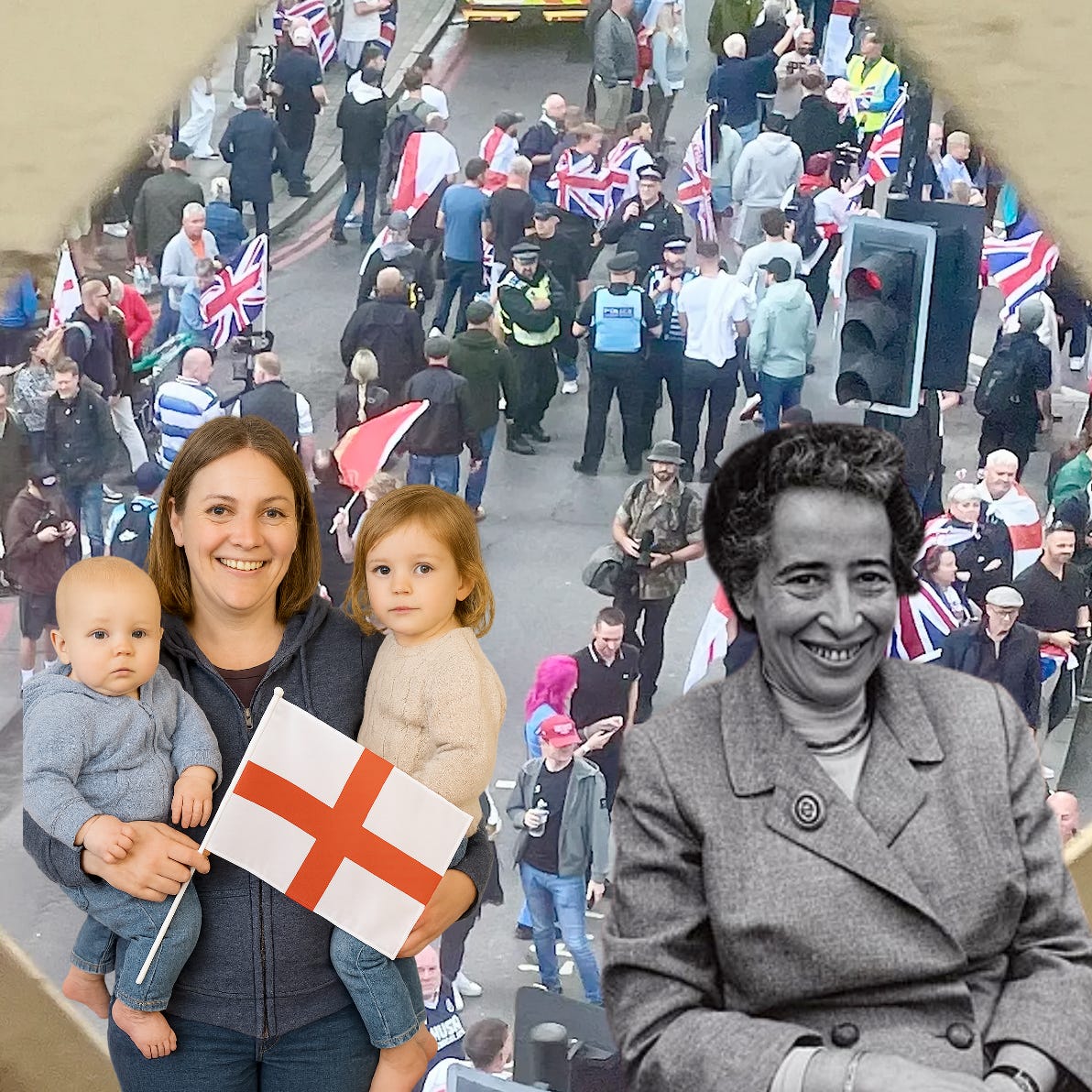

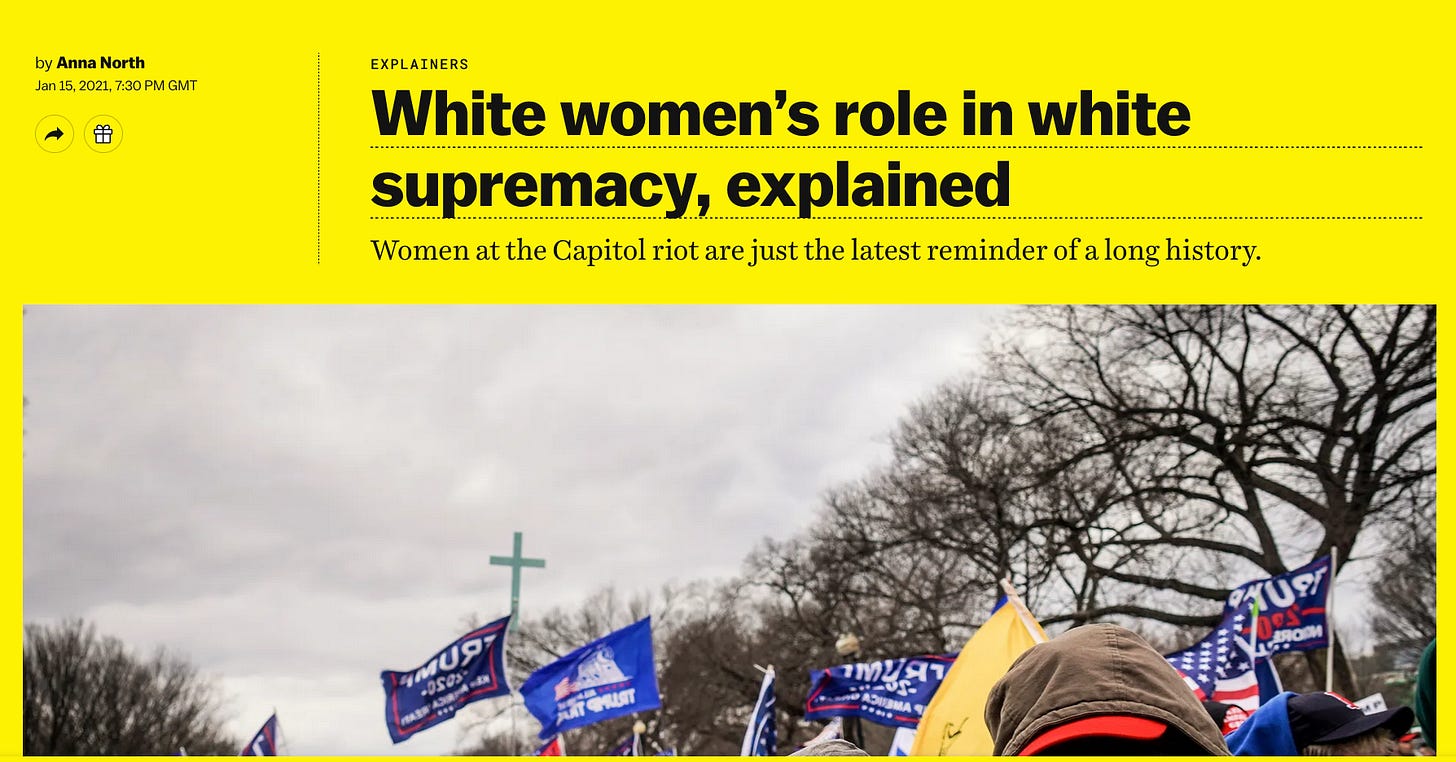
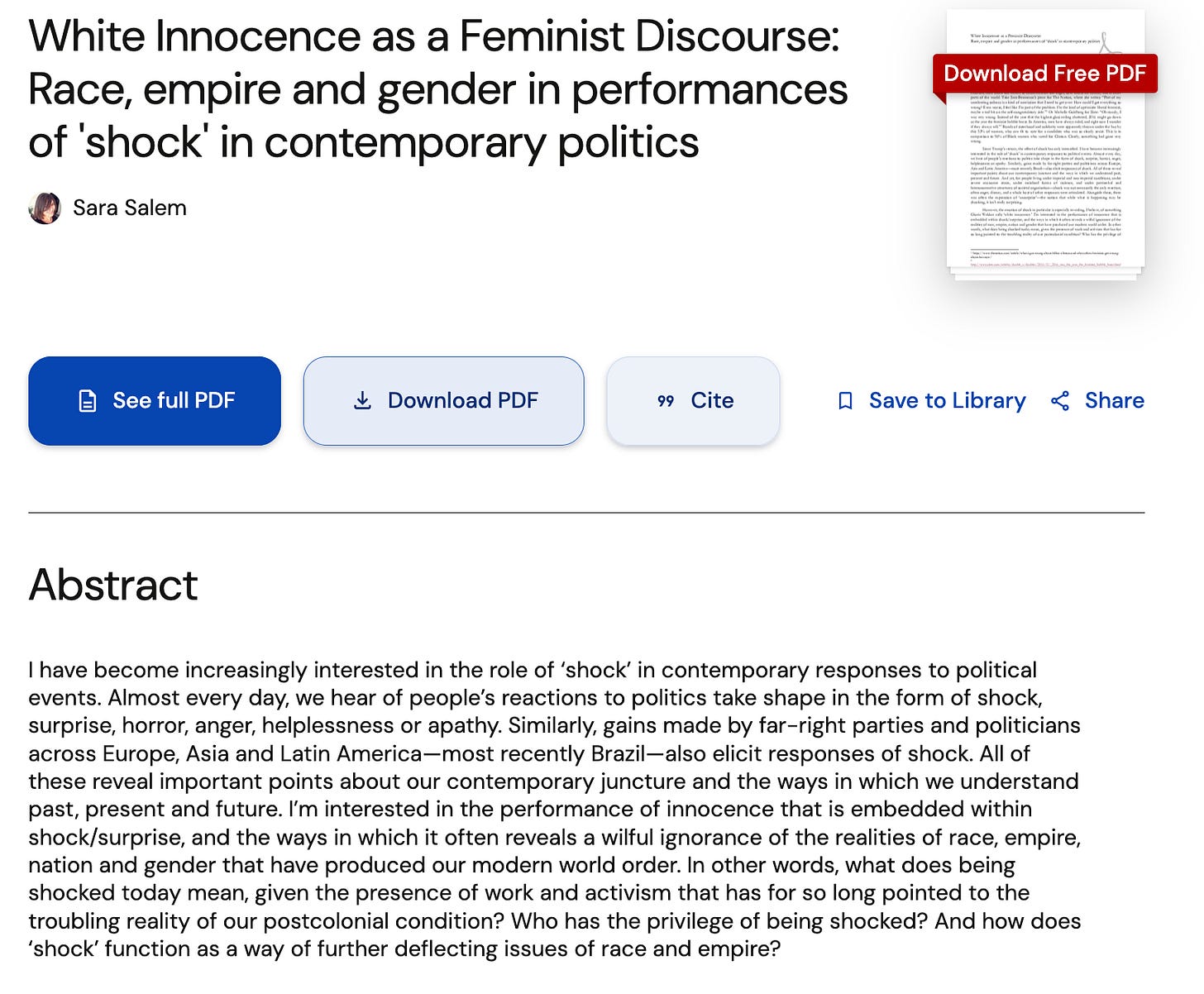
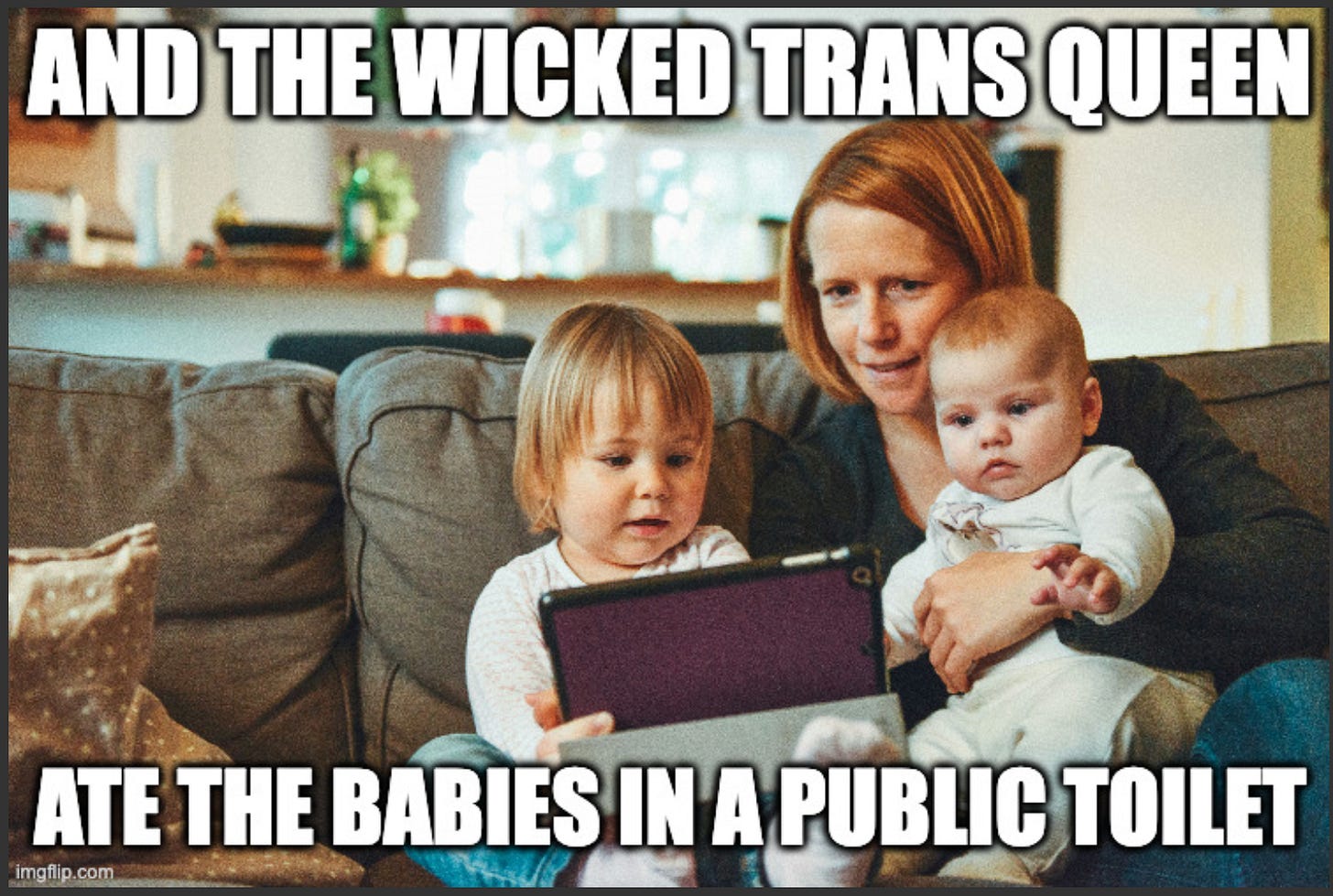
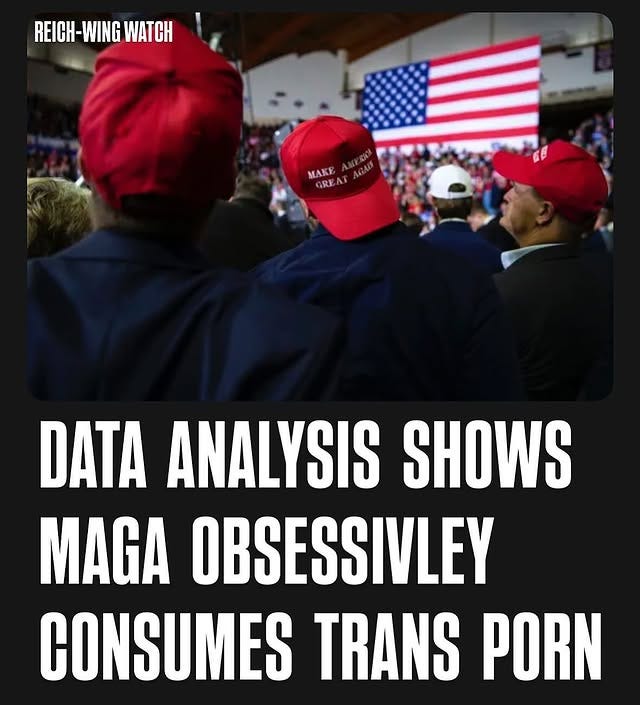
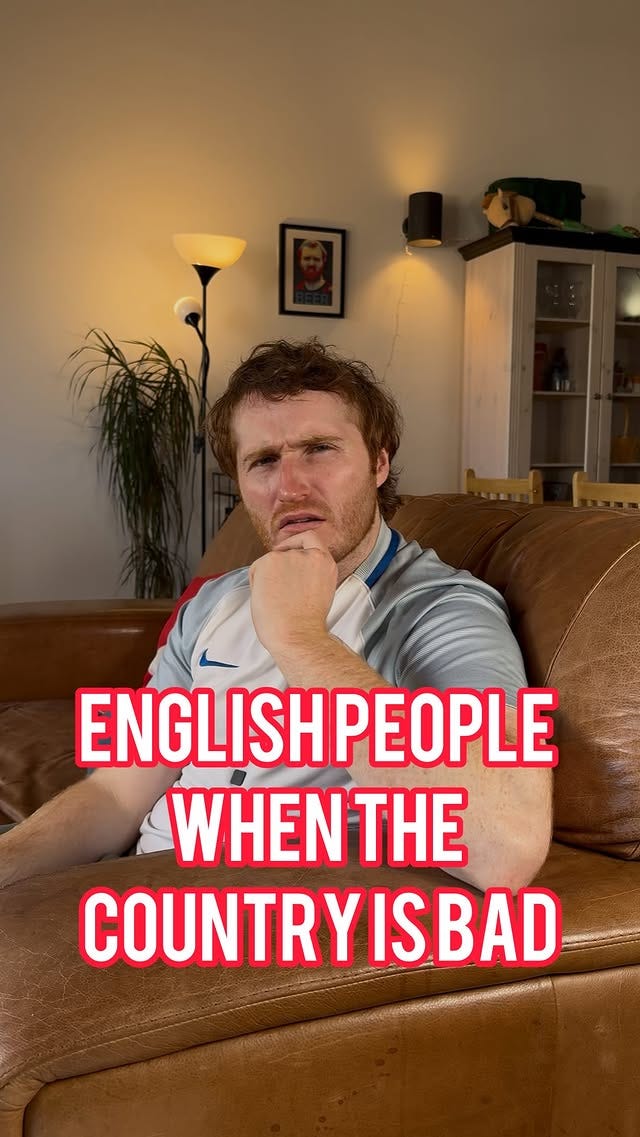

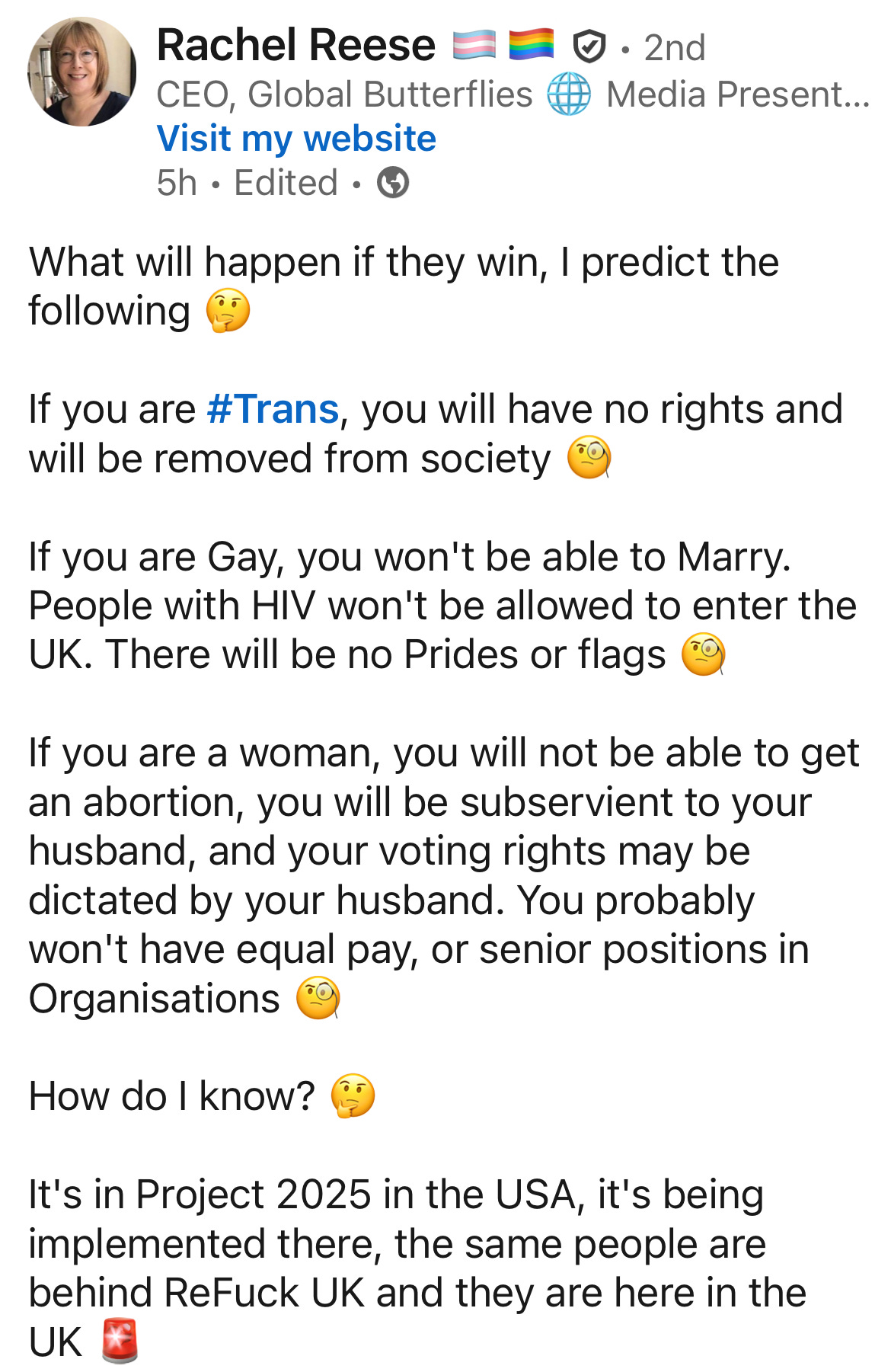
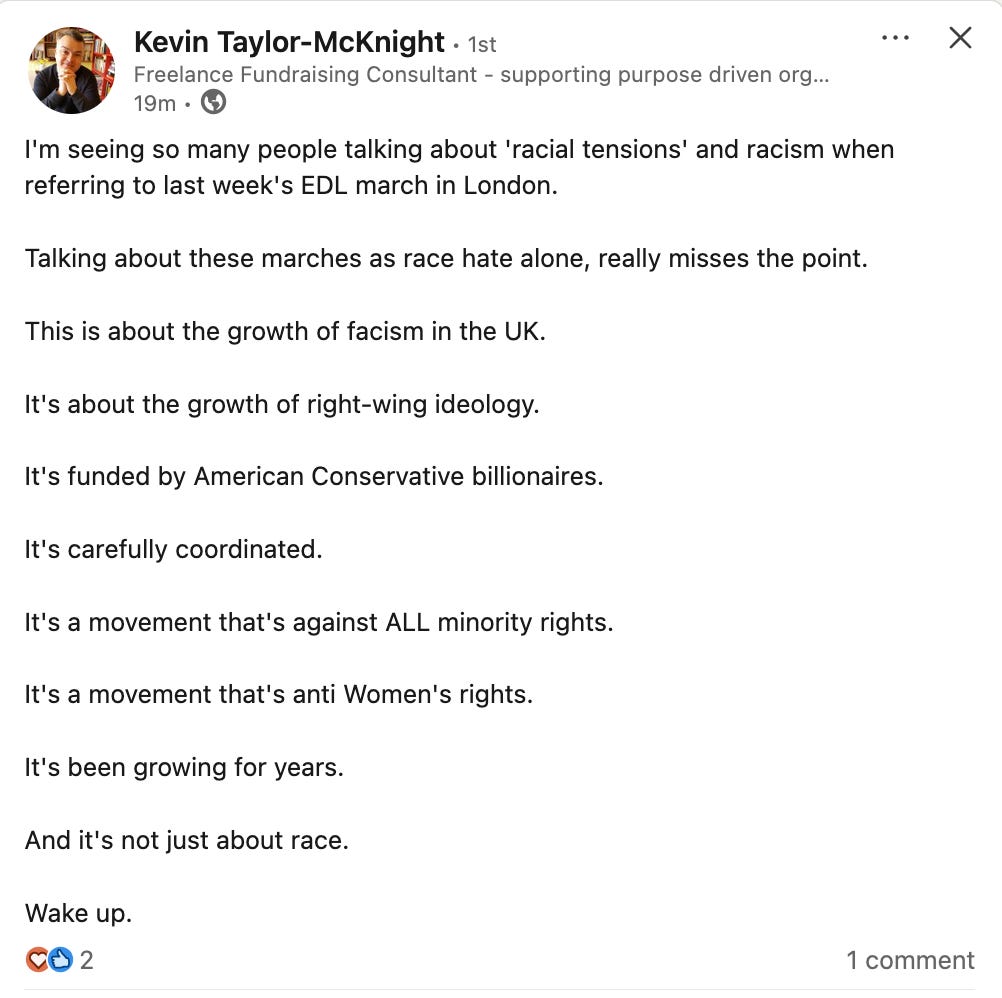
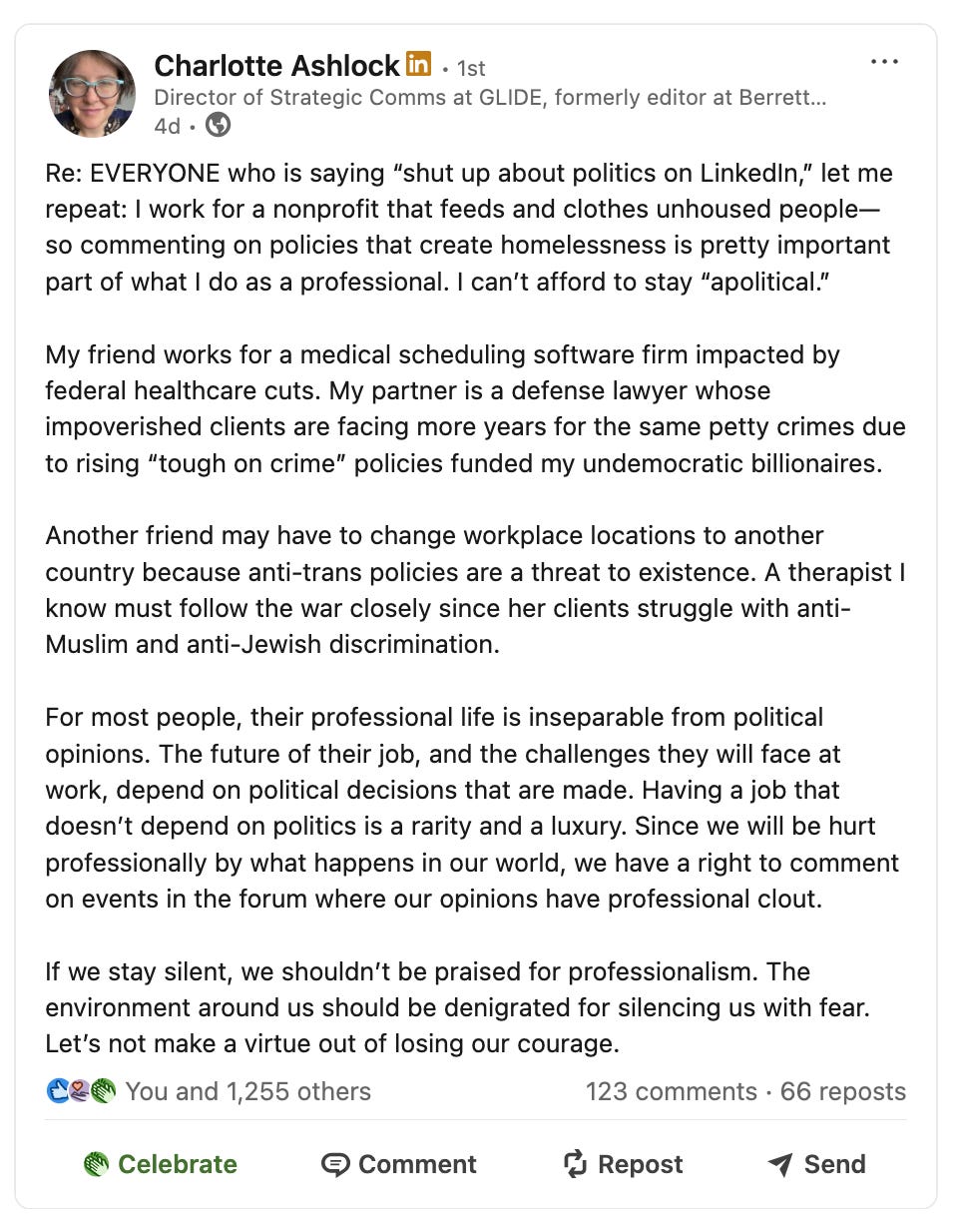



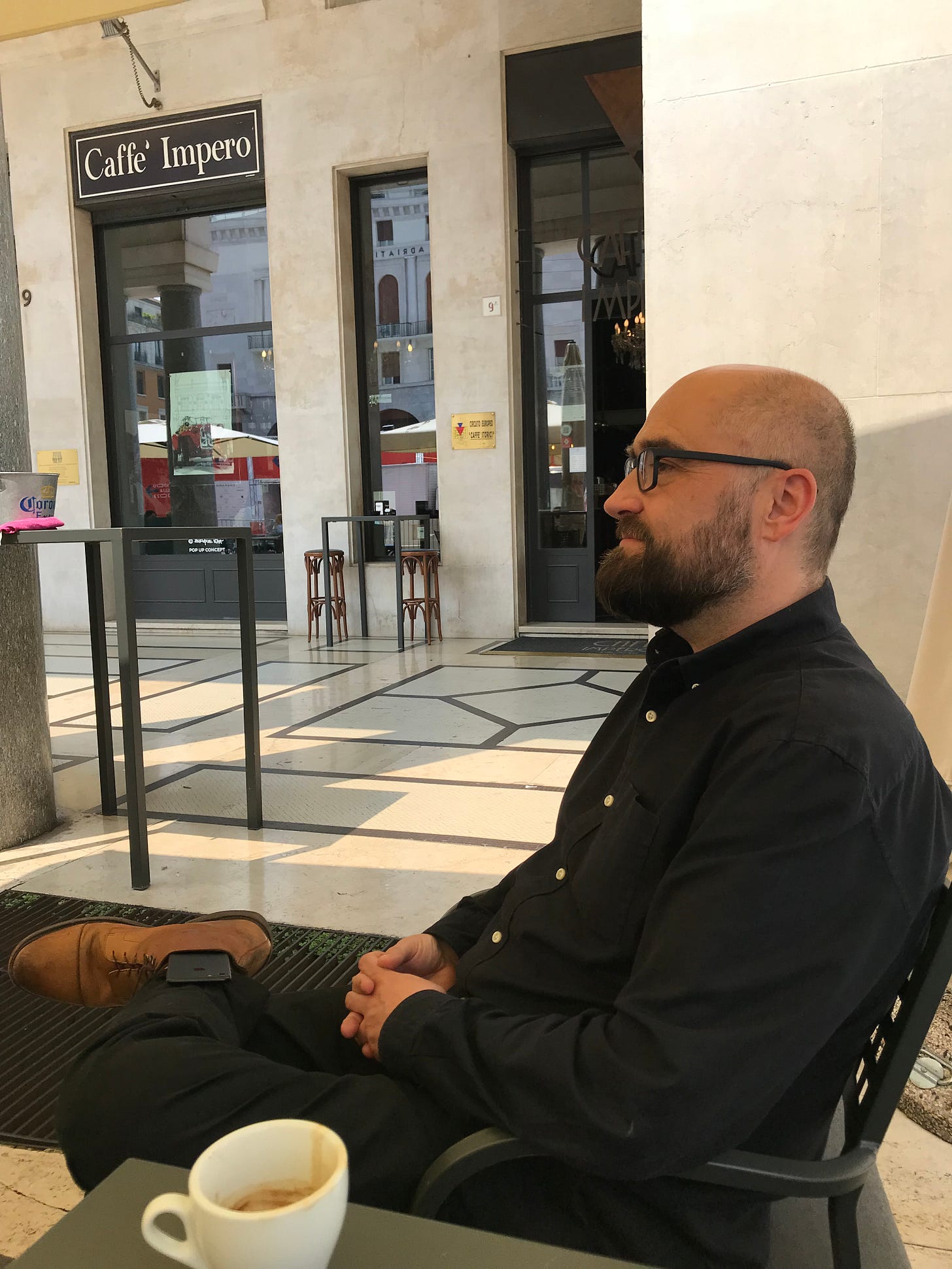
Excellent piece, Alex. I appreciate the framing, and especially the way you capture segmentation without falling into simple categories. There is nothing easy about the current moment, whether in the US, UK, or elsewhere. the influences are tangled and overlapping. Ideally, this complexity could open opportunities for collaboration or threads that move us in a better direction. The scope and organization of Project 2025, with its co-created and network approach, should be a wake-up call. Progressives in particular seem outmaneuvered once again. What feels most needed now is a clearer set of offerings/pathways that respond with both equal coherence and intent.
Great article. I’m aware that some of those who attend these marches aren’t right wingers but I didn’t consider the fascist women, making the sandwiches and fomenting racism (and equally as capable of assault). We need to avoid the binary thinking of your stereotypical antifascist.